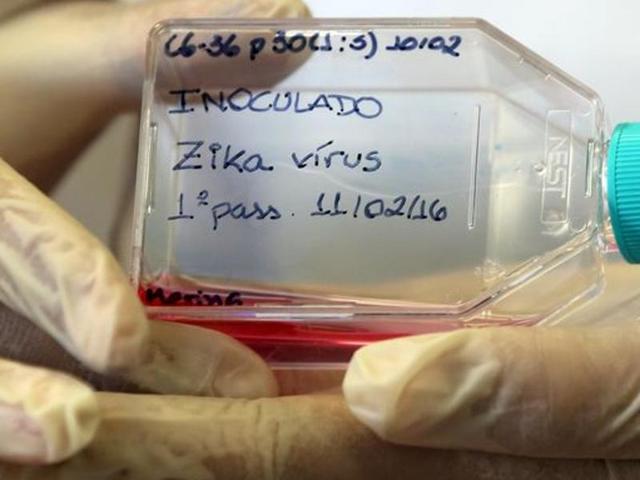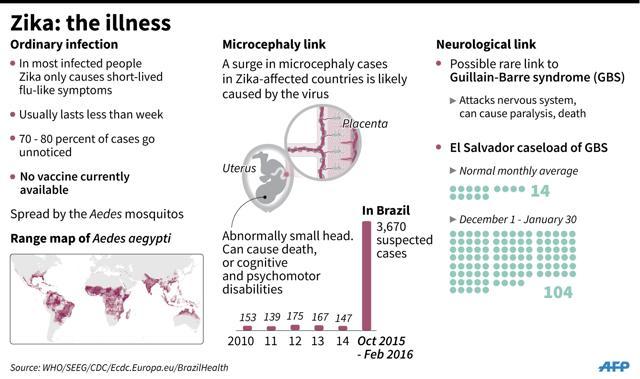Zika virus may hide in organs protected from the immune system
The Zika virus may be particularly adept at entrenching itself in parts of the body that are shielded from the immune system.
The Zika virus may be particularly adept at entrenching itself in parts of the body that are shielded from the immune system, making it harder to fight off and possibly lengthening the time frame in which it can be transmitted, top US experts said on Friday.

Researchers reported that Zika virus can be detected in semen for 62 days after a person is infected, adding to evidence of the virus’s presence in the fetal brain tissue, placenta and amniotic fluid. Their work is part of an international race to understand the risks associated with Zika, a rapidly spreading mosquito-borne virus thought to be linked to thousands of cases of birth defects in Brazil.
“Right now, we know it’s in the blood for a very limited period of time, measured in a week to at most 10 days. We know now, as we accumulate experience, it can be seen in the seminal fluid. We’re not exactly sure after the infection clears, where else it would be,” Dr Anthony Fauci, director of the National Institute of Allergy and Infectious Diseases said.
“These are all things that need to be carefully examined in natural history and case-control studies,” he said.

Fauci said that Zika’s persistence in the body recalled findings during the 2014 Ebola outbreak, the worst on record. In individual patients, the highly deadly virus remained in semen and eye fluid for months.
Zika causes only mild symptoms, and in most cases may not result in illness at all. Its suspected link to the birth defect microcephaly and to neurological disorder Guillain-Barre syndrome has generated alarm among public health officials, though an association has not been proven. The World Health Organization on February 1 declared Zika a global health emergency.
Several organs in the body, including the testes, the eyes, the placenta and the brain, are “immune privileged” --protected from attacks launched by the immune system to neutralise foreign invaders.
These sites are safeguarded from antibodies to prevent the immune system from attacking vital tissues. But if a virus enters these protected sites, it is much harder to fight them off.
“The virus can continue to persist and or multiply,” said Dr William Schaffner, an infectious disease expert at Vanderbilt University Medical Center in Nashville. “The virus is in a bubble of sorts.”
Fauci said it is not entirely surprising that Zika persists in semen. There have already been at least two reports in which the virus was likely transmitted sexually. What has not been clear is for how long.
British researchers offered some clues on Friday. In a letter to the journal Emerging Infectious Diseases, scientists reported the case of a 68-year-old man who was infected with Zika in 2014. They detected Zika virus 62 days after the initial infection, but they were not able to confirm whether it could still infect another person.
Earlier this week, researchers in Slovenia published a paper in the New England Journal of Medicine describing a severely brain damaged fetus from a mother who was infected with Zika in Brazil and later terminated the pregnancy.

In an autopsy, the authors found high levels of Zika in the brain and some evidence that the virus had been replicating. They suggested that Zika may persist in the fetal brain because it is an immunologically privileged site.
That is true of many other viruses, such as toxoplasmosis, rubella, cytomegalovirus or herpes, which can also cross the placenta and cause microcephaly, a birth defect marked by small head size and underdeveloped brains. Doctors commonly screen pregnant women for these infections, said Dr Ian Lipkin of the Center for Infection and Immunity at Columbia University in New York.
Lipkin said the key concern about Zika harbouring in immune-protected sites is that it could be transmitted sexually through semen.
So far, there is little to suggest sexual transmission is common, said Dr Eric Rubin, an infectious disease expert at the Harvard School of Public Health, “but it will bear looking at so that we can counsel individuals about the risk that they pose to others”.
US health officials advise that men who come to the country from Zika outbreak areas should consider using condoms even with non-pregnant sex partners because the virus may persist in semen even after it clears the bloodstream.
“They don’t say for how long,” Schaffner said. “That’s because they don’t know. As it was with Ebola, we’re learning as we go.”



